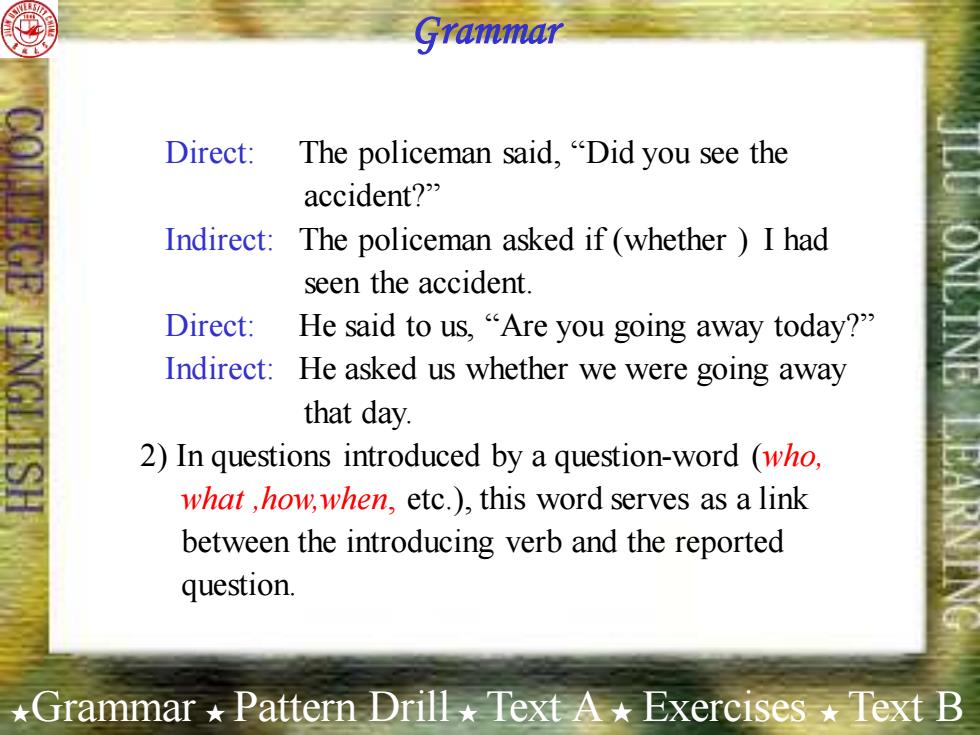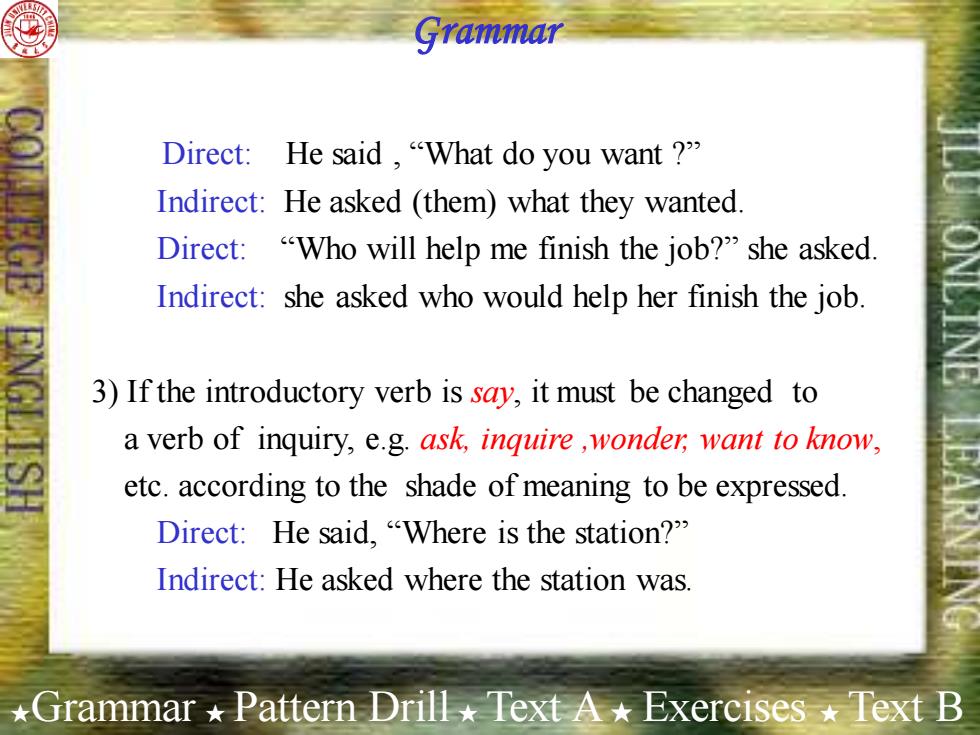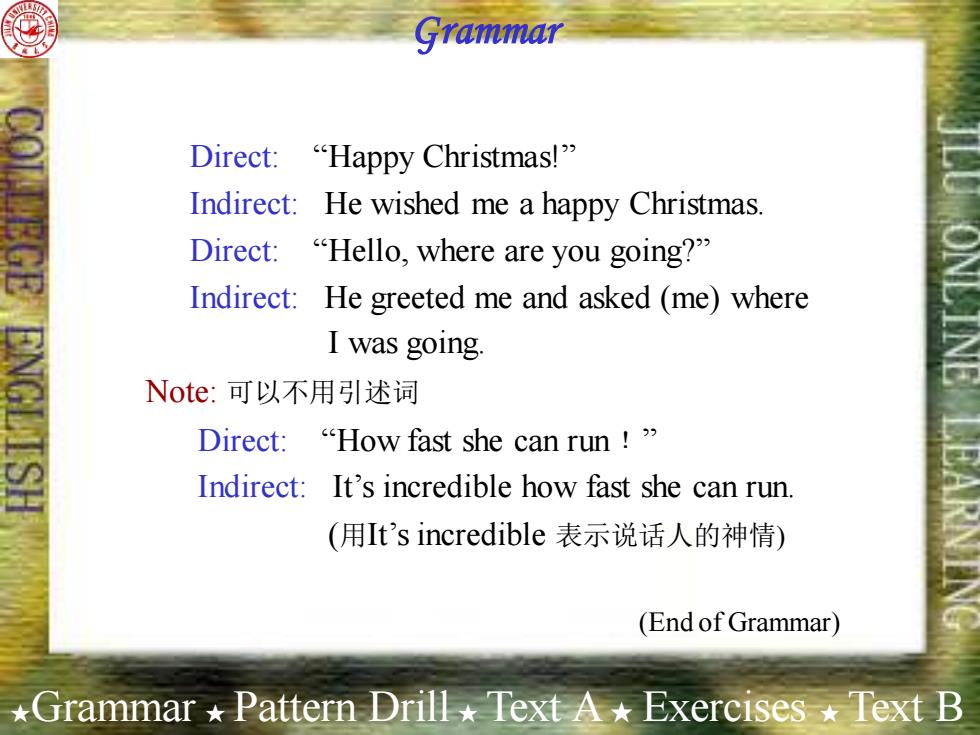
Lesson Ten Grammar Pattern Drills Text A Exercises Text B
Grammar Pattern Drills Text A Exercises Text B Lesson Ten

Grammar Part one Grammar----Indirect Speech(2) 1.Questions in indirect speech When questions are reported in an indirect way (not using the actual words of the person who originally said them),the following rules apply: I)General questions(一般疑问句)are introduced by if or whether,and the subject and verb are in their ordinary statement word order. *Grammar Pattern Drill Text A*Exercises Text B
1. Questions in indirect speech When questions are reported in an indirect way (not using the actual words of the person who originally said them), the following rules apply: 1) General questions (一般疑问句) are introduced by if or whether, and the subject and verb are in their ordinary statement word order. Grammar ★Grammar ★ Pattern Drill ★ Text A ★ Exercises ★ Text B Part one Grammar ---- Indirect Speech (2)

Grammar Direct: The policeman said,"Did you see the accident?" Indirect:The policeman asked if(whether )I had seen the accident. Direct: He said to us,"Are you going away today?" Indirect:He asked us whether we were going away that day. 2)In questions introduced by a question-word (who, what,how,when,etc.),this word serves as a link between the introducing verb and the reported question. *Grammar Pattern Drill Text A Exercises Text B
Direct: The policeman said, “Did you see the accident?” Indirect: The policeman asked if (whether ) I had seen the accident. Direct: He said to us, “Are you going away today?” Indirect: He asked us whether we were going away that day. 2) In questions introduced by a question-word (who, what ,how,when, etc.), this word serves as a link between the introducing verb and the reported question. Grammar ★Grammar ★ Pattern Drill ★ Text A ★ Exercises ★ Text B

rammar Direct: He said,"What do you want ? Indirect:He asked (them)what they wanted Direct:"Who will help me finish the job?"she asked Indirect:she asked who would help her finish the job 3)If the introductory verb is say,it must be changed to a verb of inquiry,e.g.ask,inquire,wonder,want to know, etc.according to the shade of meaning to be expressed. Direct:He said,"Where is the station?" Indirect:He asked where the station was. *Grammar Pattern Drill Text A Exercises Text B
Direct: He said , “What do you want ?” Indirect: He asked (them) what they wanted. Direct: “Who will help me finish the job?” she asked. Indirect: she asked who would help her finish the job. 3) If the introductory verb is say, it must be changed to a verb of inquiry, e.g. ask, inquire ,wonder, want to know, etc. according to the shade of meaning to be expressed. Direct: He said, “Where is the station?” Indirect: He asked where the station was. Grammar ★Grammar ★ Pattern Drill ★ Text A ★ Exercises ★ Text B

Grammar 2.Commands in indirect speech When a command in direct speech is turned into indirect speech,the following should be noticed: 1)The verb used is not say but one like order;tell,ask, request,according to the shade of meaning intended. 2)A direct object(直接宾语),representing the person ordered,is introduced. 3)The imperative form(祈使形式)of the verb in the direct command becomes the corresponding infinive(动词不定式). *Grammar Pattern Drill Text A Exercises Text B
2.Commands in indirect speech When a command in direct speech is turned into indirect speech, the following should be noticed: 1) The verb used is not say but one like order, tell, ask, request, according to the shade of meaning intended. 2) A direct object (直接宾语), representing the person ordered, is introduced. 3) The imperative form (祈使形式) of the verb in the direct command becomes the corresponding infinive (动词不定式). Grammar ★Grammar ★ Pattern Drill ★ Text A ★ Exercises ★ Text B

rammar Direct:He said,"Bring me a book!" Indirect:He asked her (him,us etc.)to bring him a book. Direct:He said to me,"Stay here." Indirect:He asked me to stay there. BUT:Note that the infinitive is not always used e.g.He told her that she should bring him a book. *Grammar Pattern Drill Text A*Exercises Text B
Direct: He said,”Bring me a book!” Indirect: He asked her (him, us etc.) to bring him a book. Direct: He said to me, “Stay here.” Indirect: He asked me to stay there. BUT: Note that the infinitive is not always used, e.g. He told her that she should bring him a book. Grammar ★Grammar ★ Pattern Drill ★ Text A ★ Exercises ★ Text B

Grammar 4)Negative commands,requests,etc.are usually reported by“not+infinitive.” Direct:"Don't do it!" Indirect:He asked me (her,us,etc)not to do it. Direct::He told me,“Don't go away.” Indirect:He told me not to go away. BUT:Note that the infinitive is not always used. e.g.He told her that she should not do it. *Grammar Pattern Drill Text A Exercises Text B
4) Negative commands, requests, etc. are usually reported by “not+infinitive.” Direct: “Don’t do it!” Indirect: He asked me (her, us,etc) not to do it. Direct: He told me, “Don’t go away.” Indirect: He told me not to go away. BUT: Note that the infinitive is not always used. e.g. He told her that she should not do it. Grammar ★Grammar ★ Pattern Drill ★ Text A ★ Exercises ★ Text B

rammar 3.Exclamations(感叹句)in indirect speech Exclamations become statements.Reporting an exclamation is usually best achieved by a roundabout expression reflecting the spirit of the original exclamation. Direct::“What a lovely garden(itis)! Indirect:He remarked that it was a lovely garden Direct:"How wonderful!" Indirect:He said it was wonderful *Grammar Pattern Drill Text A Exercises Text B
3. Exclamations (感叹句) in indirect speech Exclamations become statements. Reporting an exclamation is usually best achieved by a roundabout expression reflecting the spirit of the original exclamation. Direct: “What a lovely garden ( it is )!” Indirect: He remarked that it was a lovely garden. Direct: “How wonderful!” Indirect: He said it was wonderful. Grammar ★Grammar ★ Pattern Drill ★ Text A ★ Exercises ★ Text B

Grammar Direct:"Happy Christmas!" Indirect:He wished me a happy Christmas. Direct:"Hello,where are you going?" Indirect:He greeted me and asked (me)where I was going. Note:可以不用引述词 Direct:.“How fast she can run! Indirect:It's incredible how fast she can run (用It's incredible表示说话人的神情) (End of Grammar) *Grammar Pattern Drill Text A*Exercises Text B
Direct: “Happy Christmas!” Indirect: He wished me a happy Christmas. Direct: “Hello, where are you going?” Indirect: He greeted me and asked (me) where I was going. Note: 可以不用引述词 Direct: “How fast she can run﹗” Indirect: It’s incredible how fast she can run. (用It’s incredible 表示说话人的神情) (End of Grammar) Grammar ★Grammar ★ Pattern Drill ★ Text A ★ Exercises ★ Text B

rammar 4.Put the following into indirect speech,with the introducing verbs in the past tense.Pretend that A has said the following things to you(B).You are now reporting what A said to your friend (C) 1)How old is he now?Can he read yet? He asked how old he was and if he could read yet. 2)What do you mean?Do you think I'm mad? He asked what I meant and if I thought he was mad. *Grammar Pattern Drill Text A*Exercises Text B
He asked how old he was and if he could read yet. He asked what I meant and if I thought he was mad. Grammar ★Grammar ★ Pattern Drill ★ Text A ★ Exercises ★ Text B 4. Put the following into indirect speech, with the introducing verbs in the past tense. Pretend that A has said the following things to you (B). You are now reporting what A said to your friend (C): 1) How old is he now? Can he read yet? 2) What do you mean? Do you think I’m mad?